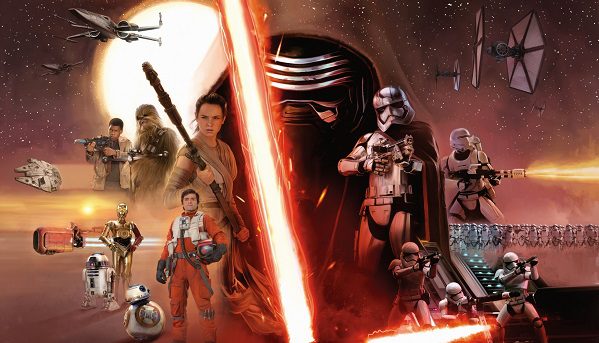
By Farouk Peru
As a lifelong fan of Star Wars (I went to see “The Empire Strikes Back” at the age of four), it is perhaps very predicable for me to link it to another great passion of my life – Islam. At one point, I watched at least one of the original trilogy every night. If you mentioned any scene to me, I could reel off the dialogue. I even played its RPGs and board games, plunging me in deeper into the universe.
Sadly, the prequels (which began in 1999) did not do it for me. Perhaps I was too old or perhaps they were too childish. Perhaps both. Whatever it was, the prequels turned me off Star Wars for the last ten years. Even viewing them was a matter of duty rather than passion. So, given my history, it will not be surprising for critics and detractors to read this and scream “confirmation bias!”
And that’s fine.
From my perspective, I see an inextricable link between Star Wars and Islam.
Let me first clarify this – I am not speaking about the classical monotheist-centric Seerah narrative, which is how people usually understand the Islamic movement. The Seerah is essentially Muhammdan history and is famously about the two stages of his life in Makkah and Madinah. No, rather I am referring to the universal principle of salaam or peace, as I understand from the Quran.
The word “islam” literally means “acquirement or activity of salaam.” This universal principle is not limited to any one religious tradition, but rather flows in all of them.
Another thing to note is that we are looking at the essence of Star Wars rather than the expression of that essence. Of course there are no telekinetic abilities or theatrical lightsabers in Islam. Nor are there space-bound ships and fighters, but are those what Star Wars is about?
No, I believe at the heart of it, Star Wars is about good versus evil.
In the Quran, the personality mentioned most often is Musa. He is mentioned 136 times across 31 chapters. In these narratives his life is very well expounded, much more so than any other Quranic personality. Let us analyze these expositions and see if they have any similarities to the Star Wars narrative.
His mission was to emancipate the people from the grasp of Firaun, the ruler of Egypt. Firaun’s system was one of oppression and used force (jund or soldiers) to enforce his bidding. Musa and his people on the other hand were a tiny force who eventually overcame them despite being vastly outgunned. This in itself is already parallel to Star Wars, in which the Alliance, vastly outnumbered and outgunned by the Empire, eventually defeats them.
Before Musa undertook his mission, he was first wandering and searching in the desert (coincidentally, Luke Skywalker began life in sand-bound Tatooine). During this time, Musa saw a fire, which allegorically represents energy and creativity. It was in this fire that he heard the calling of Allah to vivify Him. Allah then directed him to Firaun, who had exceeded boundaries.
This again reminds me of a concept from Star Wars, the ubiquitous Force. The Force is that energy field that can, if practiced correctly, bring about the good. Of course the opposite is also true, hence the dark side of the Force. Not coincidentally, the “fire” in the Quran is also used negatively for the fire can consume us as well as enlighten us.
Speaking of the dark side, the Quran also uses the light and dark to respectively connote good and evil. Interestingly, the word which is used for darkness (zhulm) also manifests as oppression – that should tell us the link between the two.
On the contrary, light (noor) comes from the same root as fire (naar, if you can see the phonetic similarities). So it would not be too far off to say that Musa discovered the light from his above mentioned experience with the divine fire. Allah, after all according to the verse of the light (Chapter 24 Verse 35), is the light of the heavens and the earth. And so this is another way Star Wars conceptually echoes the Quran
Another personality worth mentioning in this discussion is Ibrahim, the second most mentioned personality in the Quran. Ibrahim’s role in the Quranic narrative is to convey to us the philosophy of monotheism. He is exclusive mentioned with deeni-haneefa, which is the purest connection with Allah. He is also the only one who is said to be “taken as a friend (khalil, 4:125).” Interestingly, some mystics in the Islamic tradition link this word to takhalul, which means to penetrate.
Hence, Ibrahim’s being was penetrated by Allah. Like Musa, Ibrahim also establishes a system that brings reward and safety to mankind. He does this by migrating from his people, who worshipped images rather than turning to Allah. In Star Wars terms, this makes me think of how people refuse to engage with the Force and are thus stuck onto the material planes.
Obi Wan Kenobi’s famously sage advice to Luke in “Star War” to turn off his targeting computer and use the force echoes this migration from the material to the spiritual.
Not only “Star Wars,” but there are many phenomena in pop culture which echoes the sentiments of ancient religions, not just Islam and the Quran. Perhaps truth is an undercurrent in our existence and it manifests in many ways.
The important thing, whatever inspires you to higher ideals, is applied and thus achieving human evolution. For me, Islam is the acquirement of peace. And, as Star Wars canon dictates, when there is peace, there is the Force.
Farouk A. Peru is a human being in the world. He uses the faith – tradition of Islam to formulate his religious identity and as a means to truth.











